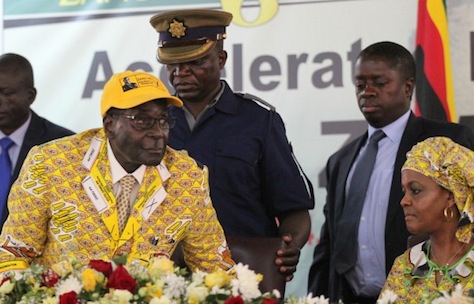After 34 years in power, and having controlled the government of Zimbabwe since virtually the moment of its independence in 1980, following the collapse of the white minority rule of what was previously Rhodesia, you’d think that president Robert Mugabe would be focused more on anointing a successor than causing more upheaval. ![]()
If so, you’d be wrong.
For a leader who emerged as the darling of Western governments in his fight for black majority rule, then became an international pariah as Zimbabwe became synonymous with one-party rule, land confiscation, oppression of the few white residents who didn’t leave in 1980 and, more recently, hyperinflation, cholera epidemics and rigged elections, it should come to no surprise that Mugabe (pictured above) still wants to call the shots, two months short of his 91st birthday.
* * * * *
RELATED: Post-election, what comes
next for Zimbabwe? [August 2013]
* * * * *
The most recent upheaval involves Joice Mujuru, vice president of Zimbabwe since 2004 and the vice president of the ruling ZANU-PF (Zimbabwe African National Union – Patriotic Front).
At age 59, she came of age during the struggle against Rhodesian white minority rule, earning the nickname ‘Spill Blood’ as a teenager in the fight for Zimbabwe’s freedom. Mujuru (pictured above) has literally spent her entire adult life working under Mugabe’s command. She’s been in government consecutively since 1980, when she was first appointed as a minister of community development and women’s affairs. Her husband, Solomon Mujuru, was until his 2011 death, the highly feared head of Zimbabwe’s military. Among the radical cadre of leaders within the ZANU-PF, Mujuru is widely viewed as a moderate voice who could have pulled Zimbabwe from its Mugabe-era isoltion into a more normal relationship with the rest of the world.
Increasingly, however, Mujuru has been subject to criticism by Mugabe’s wife, first lady Grace Mugabe (just 49 years old), that she has solicited bribes and other graft during the course of 35 years atop Zimbawe’s ruling class. Mujuru, whose husband died in a mysterious fire three years ago, has been subject to even more outrageous charges, including being an accessory to murder, cooking for Western diplomats and wearing a miniskirt.
Mugabe himself has denounced Mujuru in the lead-up to this month’s ZANU-PF leadership conference, arguing that Mujuru was behind ‘death plots’ to assassinate him:
“It is a woman who is saying she now wants to rule. We know the infiltration that has gone on. We know the discussions that have been done to link up with the (political opposition) and America will then pour in money,” Mugabe said. “You know that simplistic thinking.”
Her apparent fall from the ZANU-PF high guard is a yellow flag to markets that would prefer to see a credible succession plan in Zimbabwe.
But though Mujuru seems to be the most high-profile casualty of the current purge, no one seems safe, even Mujuru’s hard-line nemesis, justice minister Emmerson Mnangagwa, who has (for now) been designated as Zimbabwe’s new vice president.
Mnangagwa (pictured above), at age 68, who is nicknamed ‘Ngwena’ (‘crocodile’) for his ruthlessness, has also been part of Zimbabwe’s government since 1980 when, initially, he served as minister for state security, running the country’s internal surveillance program. Before returning to favor as defense secretary in 2009, Mnangagwa himself was subject to a purge in 2004 when Mujuru won the vice presidency.
Nevertheless, with Grace Mugabe set to become the leader of the women’s wing of the ZANU-PF, there’s been increasing discussion that she might emerge as Mugabe’s ultimate successor. But that would not necessarily be well-received by other ZANU-PF heavyweights, the military, political opposition groups or the public, who have derisively referred to her as ‘Dis-Grace’ for her extravagant shopping trips abroad.
Even as Mugabe’s would-be successors jostle for power and the ZANU-PF congress begins, no one knows whether Mugabe is using his own wife as a means of destabilizing the party’s factions or whether Grace Mugabe harbors genuine ambitions of becoming Zimbabwe’s second Mugabe family president.
Mugabe will die some day, however, and when he does, a scattered ZANU-PF could fall prey to Morgan Tsvangirai, formerly the country’s prime minister pursuant to a power-sharing agreement with Mugabe after the 2009 elections, and recently renewed as the leader of the opposition MDC (Movement for Democratic Change). Talk swirls that the MDC will join forces with the ZAPU (Zimbabwe African People’s Union), a competing pro-independence force that, since the late 1980s, has been content to serve as a pliant junior partner to the ZANU-PF.
That could give Tsvangirai the upper hand in the chaos that could result in a post-Mugabe Zimbabwe.


